Femia > Health Library > Your cycle > Health > Watery period blood: a sign of pregnancy or health issue?
Watery period blood: A sign of pregnancy or health issue?

- Updated Mar 1, 2025
- Published
CRAFTED BY HUMAN
Crafted by human At Femia, we provide accurate and up-to-date information at every stage of your journey, from trying to conceive, pregnancy and postnatal support. All content is created by a real person based on in-depth research and own professional experience. Femia ensures that you will receive expert advice, strict accuracy and a personalized approach from our authors/medical experts. Learn more about our editorial policy.
FACT CHECKED
Fact checked At Femia Health, we maintain the highest standards of editorial excellence in delivering content focused on helping you conceive, guiding you through pregnancy, and supporting you postpartum. Explore our content review principles to learn how we ensure the accuracy and quality of our health and lifestyle tips for every stage of your journey.
Watery period blood can be explained by a number of factors: the beginning or end of your period, low estrogen levels, hormonal birth control use, and perimenopause are all normal causes. Although in many cases it’s natural and doesn’t imply any issues, watery blood can also indicate certain health conditions, such as PCOS, thyroid issues, abnormalities of the cervix, sexually transmitted infections, and ovarian tumors. In some women, it can also be a sign of early pregnancy.
The menstrual cycle is a pivotal component of women’s health. It plays a critical role in your fertility, sexual health, and overall well-being. It’s also one of the primary contributors to your mood, sleep, energy, immune system, hormones, skin, and behavior.
The close connection of periods to different processes in your body makes them one of the best indicators of your overall health. Cycle irregularity or abnormal discharge can signify possible changes in your body, which is why the question “Is watery period blood sign of pregnancy or health issues?” isn’t uncommon among females.
Knowing the potential causes of watery period blood is important for every woman taking care of her health. In this guide, we’ll answer the most common questions related to this topic to help you understand your body better.
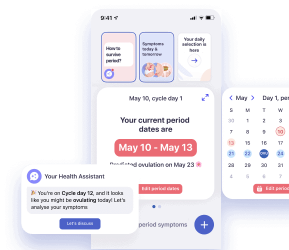
What does watery period blood indicate?
1. Beginning or end of your period
Some women may face watery discharge at the start or end of their periods. During these times, your period blood might get diluted by cervical fluid and appear pink or light pink and watery.
This is typically considered normal, so if you notice watery discharge and know that you are at the beginning or end of your period, you probably don’t have to fret too much. Use absorbent sanitary pads to prevent discomfort or leakage.
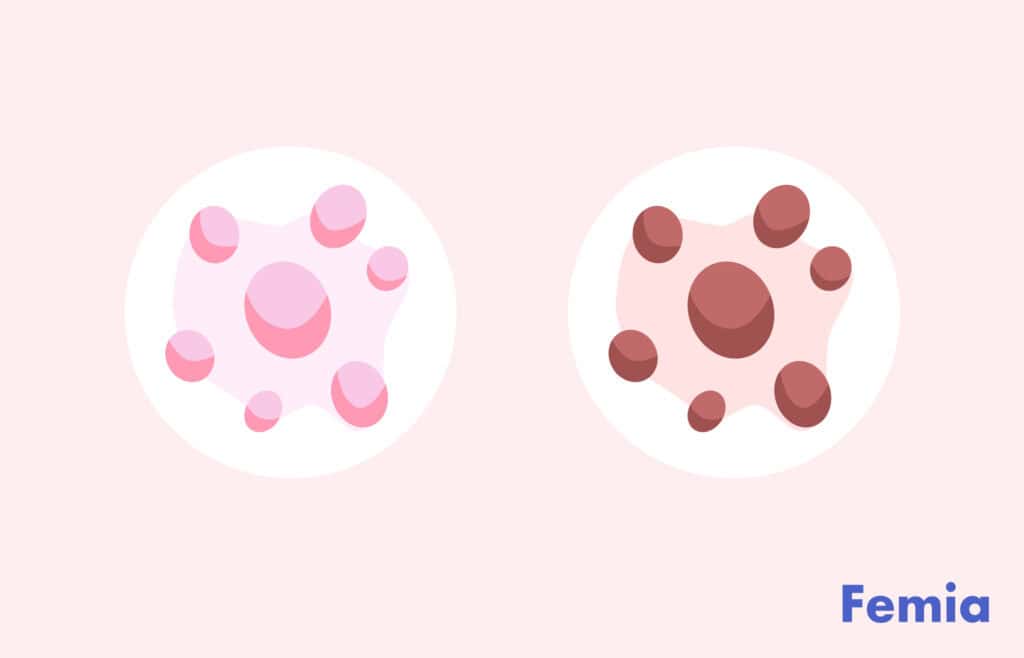
2. Low estrogen levels
Estrogen is an important hormone that coordinates the female reproductive system. It’s also responsible for the formation of secondary sex characteristics and plays a big role in the menstrual cycle, as well as the associated tissues and organs.
When the concentration of estrogen in a woman’s body decreases, it can lead to watery pink discharge. This happens because estrogen is responsible for the stabilization of the uterine lining. When it drops, that lining can shed, resulting in spotting and watery periods for some women.
Here are some common signs that your estrogen levels might be low:
- Hot flashes;
- Sleep issues;
- Mood swings;
- Headaches;
- Reduced libido;
- Pain during sex;
- Dry skin;
- Irregular periods.
3. Effects of hormonal birth control
Birth control pills, hormonal IUDs, injections, implants, and rings might affect your menstrual health by interfering with your typical cycle. These contraceptives change the hormonal balance in your body and hence, can have two opposite effects on your periods:
- Cause continued cyclic bleeding;
- Stimulate complete (or partial) suppression of the normal cycle.
In both cases, hormonal birth control may change the consistency and flow of your period blood.
4. Approaching menopause
Perimenopause is a natural aging stage in women that takes place before they enter their menopausal phase. This stage is accompanied by various inner changes (often irregular and unpredictable), including decreasing levels of the hormones estrogen and progesterone.
One of the primary symptoms of perimenopause is a changing menstrual cycle. Some females may experience variability in cycle length, period irregularity, and changing blood consistency. However, 15% to 25% of women experience minimal or no menstrual changes before their final menstrual period.
5. Underlying health conditions
Watery period discharge may sometimes indicate certain health conditions, such as:
- Polycystic ovary syndrome (or PCOS)–An endocrine disorder that occurs in women of reproductive age and can lead to a range of other issues in the long run. PCOS can be detected through biochemical tests and ultrasound scanning.
- Thyroid issues–The thyroid is a small gland located in the front of your neck. It’s responsible for producing hormones that manage many of your body’s organs and crucial functions. Sometimes, watery discharge can be a sign of inflammation or other issues in the thyroid gland.
- Ovarian tumors–Ovarian tumors are abnormal growths on the ovaries, the female reproductive organs that produce eggs. These tumors can be both noncancerous (benign) or cancerous (malignant). In some women, this condition may be a cause of watery blood.
If you are not only wondering “Why is my period watery?” but also notice additional symptoms, it can be a good idea to see a doctor and address the possible issue early on to prevent disease progression.
6. Nutritional deficiencies
The food you consume and the nutrients you get from it can also affect your menstrual health. Sometimes, the thin texture of your period blood could indicate a vitamin deficiency or extreme weight fluctuation. Both of these causes are often explained by a lack of balance and nutrients in your diet, which can affect your cycle.
Here’s a handy table of essential nutrients that can support your menstrual health:
| Nutrient | Benefits |
|---|---|
| Vitamins B6 and B1 | • May reduce pain, mood swings, and cramps
• May ease PMS |
| Vitamin E (alpha-tocopherol) | • Reduces menstrual pain
• May ease heavy blood flows |
| Vitamin D | • Is linked to cycle regulation
• May boost mood and relieve muscle pain |
| Magnesium | • May ease mood swings and relieve anxiety
• Can reduce cramps |
| Calcium | • May reduce fluid retention, food cravings, cramps, and mood swings
• Can ease PMS |
| Zinc | • Can support the overall immune system
• May relieve cramps, pain, and depression |
| Fish oils | • May ease period cramps, mood swings, and pain |
Despite the potential benefits of these nutrients, remember that high doses of even healthy supplements could potentially lead to adverse effects, including allergies, blood thinning, etc. It’s important to keep your diet balanced and avoid both deficiency and surplus of different nutrients.
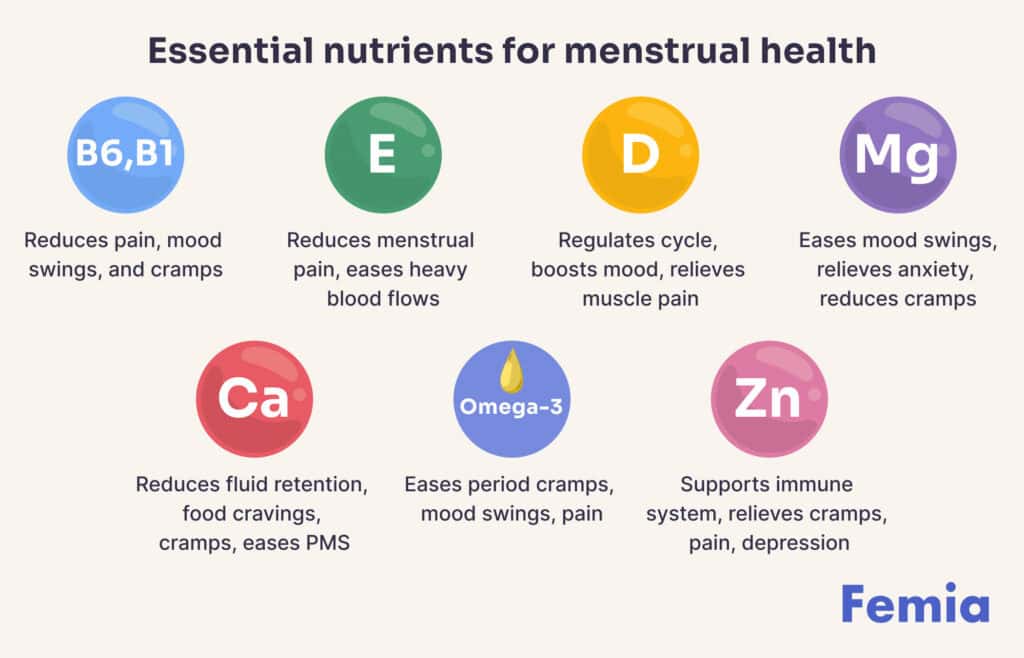
Can watery period blood be a sign of pregnancy?
As you already know, there are many different causes of thin menstrual discharge. Yet, there is one more possible reason you should be aware of, and it’s pregnancy.
If you are asking yourself “Why is my period blood watery?”, you need to understand the concept of implantation bleeding.
In a nutshell, this is a small amount of bleeding or light spotting that occurs 10-14 days after conception. It results from the movement a fertilized egg makes to attach to the interior lining of the uterus. Experts emphasize that around one third of pregnant females experience this phenomenon, which is why it’s usually not considered a sign of any issues.
If you’ve noticed thin, bloody discharge and pregnancy is a possibility, consider taking a pregnancy test or seeing your doctor to confirm or refute it.
👉Find out more: Implantation bleeding vs. miscarriage: Key differences explained
Pregnancy bleeding vs. Period blood
Implantation bleeding can resemble watery period blood, but these two are not the same. So, if you are wondering “Is my watery period blood sign of pregnancy or just menstruation?”, here’s a table that explains the primary distinctive features and can help you understand what you are dealing with:
| Bleeding type | Amount and flow | Color | Duration | Timing |
|---|---|---|---|---|
| Implantation bleeding | Light flow or just spotting that is mostly noticed when a woman wipes and is enough to wear a simple pantyliner. | Typically lighter compared to period blood. The color can range from light pink to dark brown. | 1-2 days | Around 6-12 days after ovulation. |
| Period bleeding | Full flow with larger amounts of blood, often sufficient to fill pads and tampons. | Bright or dark red and can change depending on the day of the period. Mostly consistent with previous the color you’ll have noticed during previous cycles. | 3-7 days | At regular cycle time. |
Noticing slight differences in the nature of implantation and period bleeding can tell you whether it’s pregnancy or periods. However, the best way to tell for sure is to take a pregnancy test or make an appointment with your doctor.
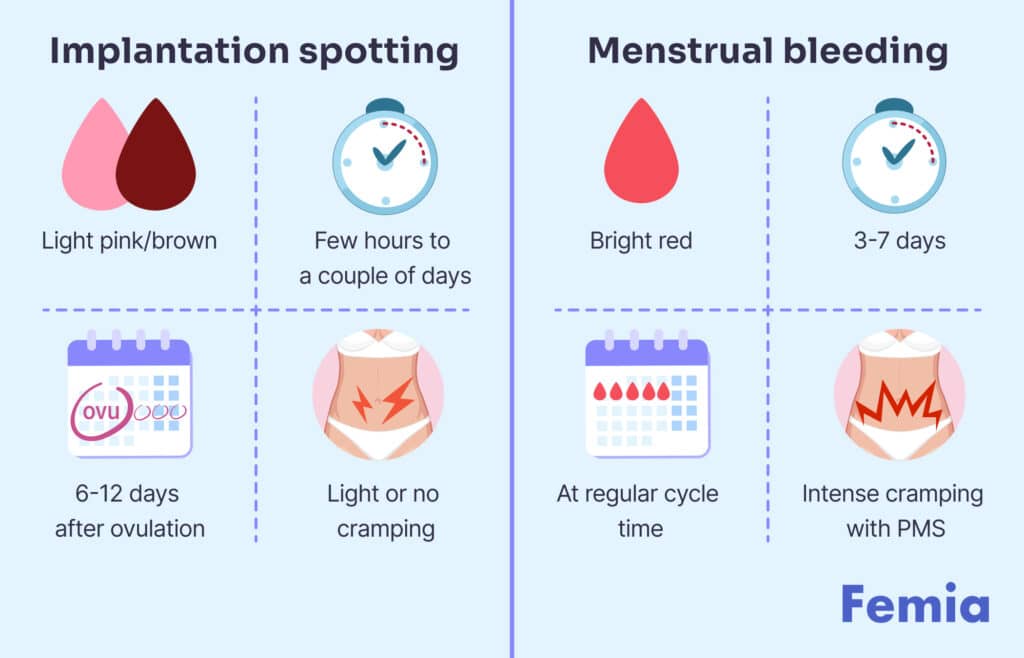
Is it normal to have watery blood during early pregnancy?
For everyone wondering “Early pregnancy, my period blood is light pink and watery. Is it okay?”, the short answer is yes, it is okay.
The American College of Obstetricians and Gynecologists (ACOG) reports that bleeding is rather common and happens in 15 to 25 in 100 pregnancies. It’s often explained by an increased number of blood vessels developing in the cervix area. In most cases, it is not a sign of problems. It’s also not uncommon to see light bleeding or spotting after a pelvic exam, Pap test, or sex during early pregnancy. Using a pregnancy app can help you track early pregnancy symptoms.
When to see a doctor?
Watery period discharge can have many reasons and is usually not a sign that anything is wrong. Still, it can sometimes be a sign of a problem and might require a consultation with a professional.
It’s recommended to see your doctor on the following occasions:
Excessive bleeding
If you notice that your discharge is watery and the flow is quite heavy, consider consulting with a doctor. Excessive bleeding can potentially lead to a number of issues, such as iron deficiency and anemia—a condition in which your red blood cells and the hemoglobin in them decrease.
Here are some symptoms of anemia:
- Weakness;
- Tiredness;
- Cold hands and feet;
- Irregular heartbeat;
- Shortness of breath;
- Chest pain;
- Pale or yellowish skin;
- Dizziness or lightheadedness.

Irregular cycles
If your watery period blood is accompanied by irregularities in your cycle, it is another reason to consider getting a professional consultation. Irregular menstrual cycles could signal health conditions like hormonal imbalances, PCOS, or thyroid issues.
Severe pain
Pain is an important signal to your body that something is wrong. Thus, it might be another reason to turn to a doctor. Pay attention to your well-being, and consider scheduling a visit with your doctor if you experience severe pain or cramps that disrupt your everyday life.
Unusual symptoms
You should always pay attention to the symptoms you experience during menstruation, so you’ll be able to notice any significant changes. For example, symptoms like sudden weight gain, severe mood swings, or changes in hair growth could indicate that there are some issues or imbalances in your body.
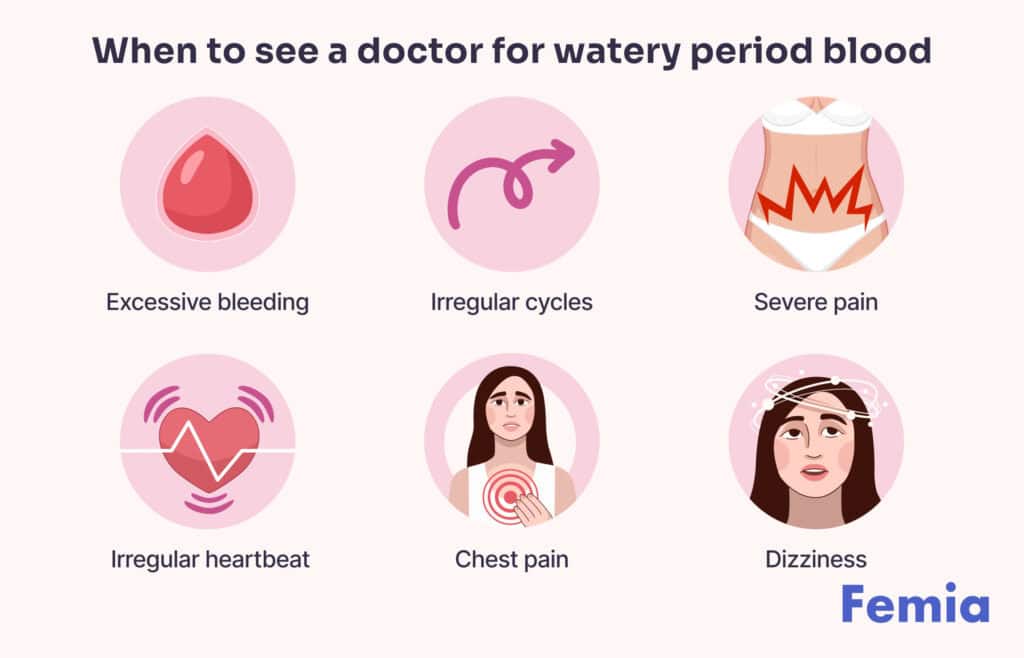
Questions from the Femia community
What should I do if my period blood suddenly becomes watery?
Analyze the timing, flow, amount, and color of your discharge to distinguish if it’s just a watery period, implantation bleeding, or might have another cause. Consider taking a pregnancy test to confirm or refute the possibility of pregnancy. Also, stay attentive to additional symptoms you might have, and to turn to a professional if you experience anything unusual.
Are there any home remedies to address watery period blood?
Watery periods are often normal and should not cause serious concern, because they can appear due to a variety of reasons. They can signal certain health conditions, but in this case, you should consult with your doctor to find out the cause.
Should I track my period blood consistency?
Yes. Period blood can vary significantly in its consistency, flow, color, and other factors. Many of these variations are natural. However, sometimes, drastic changes in your discharge could signal internal issues. Keeping track of the symptoms and traits your periods usually have can help you notice any changes.
The bottom line
Watery period blood can be a natural thing for your body, especially at the start or end of your period. It might also be a sign of certain changes in your body, such as a decreased level of estrogen, hormonal birth control, or approaching menopause. In some cases, it might be a sign of nutritional deficiencies or certain health conditions. And yes, it could be an early sign of pregnancy.
Leverage this knowledge to understand your body better and be able to notice accompanying symptoms, and turn to a healthcare specialist if it’s needed.
References
- Ott SM. “Reproductive hormones and skeletal health in young women.” J Clin Endocrinol Metab, Apr. 2008. https://www.ncbi.nlm.nih.gov/pmc/articles/PMC2729184/.
- “Irregular Periods: Why Is My Period Late?” Penn Medicine, 2, Nov. 2020. https://www.pennmedicine.org/updates/blogs/womens-health/2020/november/irregular-periods-why-is-my-period-late.
- Stubblefield PG. “Menstrual impact of contraception.” Am J Obstet Gynecol, May, 1994. https://pubmed.ncbi.nlm.nih.gov/8178900/#:~:text=Hormonal%20contraceptives%20may%20have%202,the%20hormones%20on%20day%202.
- Harlow SD, Paramsothy P. “Menstruation and the menopausal transition.” Obstet Gynecol Clin North Am., Sep. 2011. https://www.ncbi.nlm.nih.gov/pmc/articles/PMC3232023/.
- Greendale GA, Ishii S, Huang MH, Karlamangla AS. “Predicting the timeline to the final menstrual period: the study of women’s health across the nation.” J Clin Endocrinol Metab., Apr. 2013. https://pubmed.ncbi.nlm.nih.gov/23533245/.
- Patel S. “Polycystic ovary syndrome (PCOS), an inflammatory, systemic, lifestyle endocrinopathy.” J Steroid Biochem Mol Biol., Sep. 2018. https://pubmed.ncbi.nlm.nih.gov/29678491/.
- Synoracki S, Ting S, Schmid KW. “Entzündungen der Schilddrüse [Inflammatory diseases of the thyroid gland].” Pathologe, May, 2016. https://pubmed.ncbi.nlm.nih.gov/27100868/.
- Froyman W, Timmerman D. “Methods of Assessing Ovarian Masses: International Ovarian Tumor Analysis Approach.” Obstet Gynecol Clin North Am., Dec. 2019. https://pubmed.ncbi.nlm.nih.gov/31677746/.
- Pirke KM, Schweiger U, Lemmel W, Krieg JC, Berger M. “The influence of dieting on the menstrual cycle of healthy young women.” J Clin Endocrinol Metab., Jun. 1985. https://pubmed.ncbi.nlm.nih.gov/3923022/.
- Łagowska K. “The Relationship between Vitamin D Status and the Menstrual Cycle in Young Women: A Preliminary Study.” Nutrients, 11, Nov. 2018. https://www.ncbi.nlm.nih.gov/pmc/articles/PMC6265788/.
- “What is Implantation Bleeding?” American Pregnancy Association. https://americanpregnancy.org/pregnancy-symptoms/what-is-implantation-bleeding/.
- “Bleeding During Pregnancy. FAQs.” The American College of Obstetricians and Gynecologists (ACOG). https://www.acog.org/womens-health/faqs/bleeding-during-pregnancy.
- “Iron deficiency anaemia.” the National Health Service (NHS), 26, Jan. 2024. https://www.nhs.uk/conditions/iron-deficiency-anaemia/.
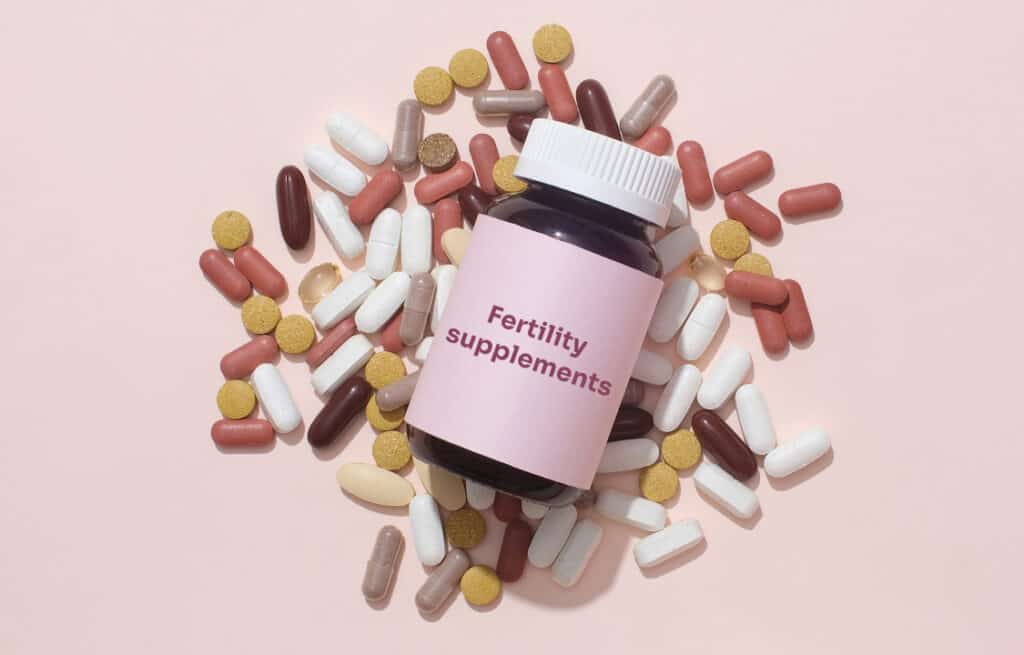
Boost your fertility naturally with essential supplements and a balanced diet. Learn about CoQ10, Omega-3, Vitamin D, and other crucial nutrients for reproductive health.

Wondering what erogenous zones are, how to find them, and what type of stimulation to choose? Let’s dive into the topic and discuss both the obvious and the unexpectedly sensitive areas.
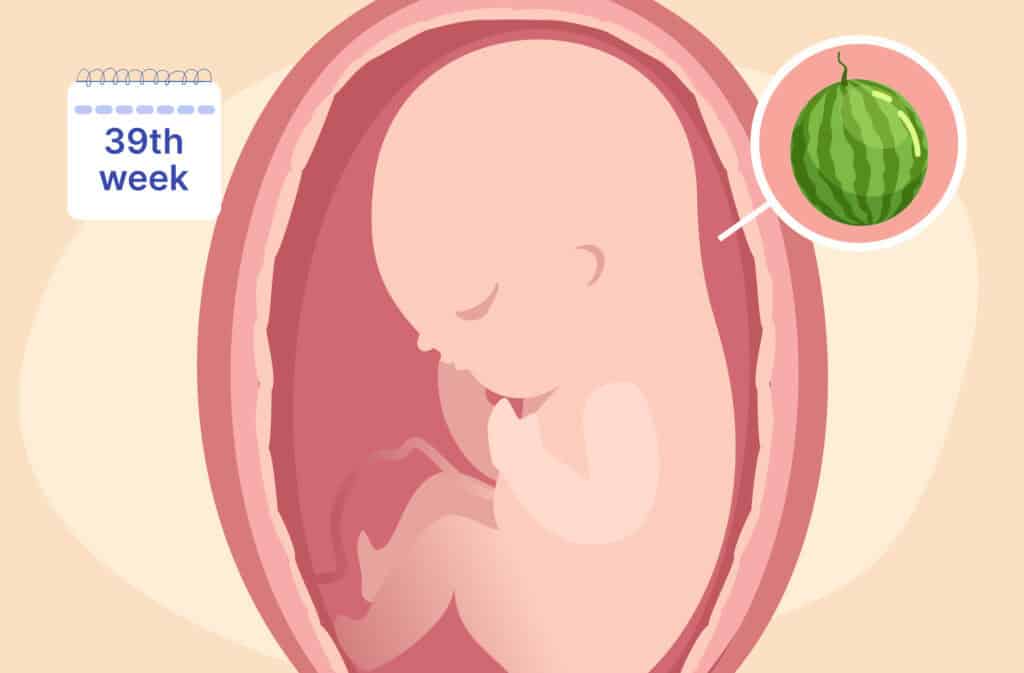
At 39 weeks pregnant, your baby is ready to arrive. Learn about labor signs, discharge, and tips for managing delivery anxiety.

